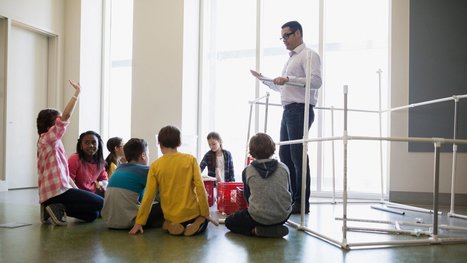 Your new post is loading...
 Your new post is loading...
As a society, we tend to focus a lot on answers. Answers are solutions to problems. We tend to give less prestige to questions. Everyone has them. They’re easy. It’s the answers that take the work.
This overlooks the power of questions. Asking questions gives you a better understanding of everything: the situation you are in, the challenges you are facing. Life.
Via John Evans
Educators want their students to ask questions. Indeed, research has found that students only ask about 1/5th the amount of questions educators would like them to ask. Yet many educators report that it can feel like “pulling teeth” to get their students to ask questions, and other research has found that educators ask about two questions per minute while students ask about two questions per hour. Which students are the ones formulating two questions per hour? One study found that lower income students tend to pose fewer questions at school than their moderate-income counterparts, and another study found that lower achieving students tend to ask fewer questions than their higher achieving peers. Not only are students asking markedly fewer questions than the teacher and significantly fewer questions than teachers would like them to ask, some students are asking fewer questions than their fellow students.
How can education remedy this feeling of “pulling teeth” and actualize a vision of all students asking their own questions and classrooms brimming with curiosity? One way is by deliberately teaching students how to ask their own questions.
Via John Evans
We teachers are constantly reflecting on our practice and professional growth. We want to make sure we are doing the best for our students despite the demands of constant assessment, unanticipated curricular changes and continually changing student needs and demographics. Combined with our own desire for excellence, this is so overwhelming. I’ve attended really inspiring professional development, only to figure out that teaching materials, specialized training and additional technology are out of reach for most school budgets. Where can teaching professionals go for support as we try to improve?
I have discovered rich support and learning in my own backyard when I have collaborated with my teacher-librarian. This educational professional is often under-utilized in a school environment. Many teachers see the librarian interact only with students, but they are invaluable resources for teachers as well.
Via John Evans
"Cheryl Zubrack is a master in the area of inquiry education, and she spoke with me at length in a deep-dive on the topic. We touch on home renos as real-life inquiry learning, cluster zero of the curricula, slowing down the learning process, inquiry into inquiry, structures and misconceptions of inquiry, conceptions of power in the classroom, working with Task – Intent – Criteria, credits/marks/exams, finding inner power, the hierarchy of questions and more!"
Via John Evans
Inquiry Based Instruction has been an area of study for me for the last couple of years. In my opinion, teaching through inquiry is not only engaging for our students, but develops an essential skill that our kids need to be successful in the 21st century. In this post, I want to share a few of the resources I have been using for the last few years, as well as a few resources that I just learned about.
Via John Evans
Collaborative Inquiry in Ontario
What We Have Learned and Where We Are Now
“Our education system will be characterized by high expectations and success
for all. It will be responsive, high quality, accessible and integrated from early
learning and child care to adult education.”
– Achieving Excellence: A Renewed Vision for Education in Ontario, 2014
The commitment to excellence and equity in Ontario education is about the success and
well-being of every learner. How will the province go about realizing this ambitious
commitment? Substantial evidence from research conducted in Ontario and internationally
suggests that collaborative inquiry (CI) – a practice of engaging educators as
researchers – holds great promise as a provincial approach. It has been shown to be
an effective means to both professional learning and to enhanced student learning
(Comber, 2013; Hannay, Wideman & Seller, 2010; Timperley, & Lee, 2008).
Through CI, educators work together to improve their understanding of what learning
is (or could be), generate evidence of what’s working (and what’s not), make decisions
about next steps and take action to introduce improvements and innovations.
And then they start again on emerging new issues and challenges. Notably, CI sees
educators as key participants in understanding how to achieve excellence and equity
in education. Learn more / En savoir plus / Mehr erfahren: http://www.scoop.it/t/21st-century-learning-and-teaching/?&tag=Inquiry+Learning http://www.scoop.it/t/21st-century-learning-and-teaching/?&tag=Collaboration
Via Gust MEES
This weekend was incredibly productive. Not only did I continue finishing my new front deck (yes, there is a math lesson in there) but I also learned about a really neat tool that stimulates curiosity, inquiry, critical thinking and collaboration while providing video feedback. I’m changing the course slightly with this post (what, not coding?!?) because I want to explore shifting pedagogy in how educators instruct, assess and evaluate student learning.
Via John Evans
Encourage students to persist through challenges to build a growth mindset. In this video we discuss tips and strategies you can use to help students persevere through learning challenges.
Via Tom D'Amico (@TDOttawa)
Can inquiry-based and project-based learning exist in a traditional industrial-age school? It may be time for schools to invent fresh ecosystems designed specifically for inquiry.
Via Becky Roehrs
Design Thinking is the confidence that everyone can be part of creating a more desirable future, and a process to take action when faced with a difficult challenge. That kind of optimism is well needed in education. Classrooms and schools across the world are facing design challenges every single day, from teacher feedback systems to daily schedules. Wherever they fall on the spectrum of scale—the challenges educators are confronted with are real, complex, and varied. And as such, they require new perspectives, new tools, and new approaches. Design Thinking is one of them.
"In this posting, we’ll look at options to increase the depth of your instruction. What you’ll notice throughout the activities is a shift to student ownership of learning, as well as the need to think at higher levels to complete the activities."
Via Beth Dichter
|
Free resource of educational web tools, 21st century skills, tips and tutorials on how teachers and students integrate technology into education
Via Tom D'Amico (@TDOttawa)
"“Alexa, What’s the temperature?”
“Alexa, How much does Kevin Durant make?”
“Alexa, play Beastie Boys.”
These commands are more and more common around our house as my kids learn how to get answers to their questions and access content. My 8 and 10-year-olds have grown up in a world where they can command information and content on demand, where they can pick their favorite TV show on Netflix, or watch videos on YouTube on any topic that piques their interest. They know a vast amount of information exists for their learning, and they can tap into multiple devices to access information, people, and entertainment—whenever they want and wherever they are. But it’s fair to point out that just because we can find the information doesn’t mean that a Google search should be our default.
The challenge here is that technology increasingly provides easy access to answers, but if we focus only on the answers and not on thinking, questioning, and solving, we rob students of powerful learning experiences. Perhaps more significantly, we fail to develop the 21st-century literacies that will empower them to solve complex problems and be lifelong learners. As technology advances, the role of educators (and parents) to model and guide learners to find information and to learn to how to ask better questions has become even more crucial in the development of critical thinkers. "
Via John Evans
In one of the episodes of “Brain Games with Jason Silva”, witnesses of a car crash are asked to estimate the speed of the car involved. Some estimated that the speed was about 10–20 mph, while some…
Via John Evans
In the age of information, factual answers are easy to find. Want to know who signed the Declaration of Independence? Google it. Curious about the plot of Nathaniel Hawthorne’s famous novel, “The Scarlet Letter”? A quick Internet search will easily jog your memory. But while computers are great at spitting out answers, they aren’t very good at asking questions. But luckily, that’s where humans can excel.
Curiosity is baked into the human experience. Between the ages of 2 and 5, kids ask on average 40,000 questions, said Warren Berger, author of “A More Beautiful Question,” at the Innovative Learning Conference hosted at the Nueva School. Young kids encounter something new, learn a little bit about it, get curious and then continue to add on a little more information with each new discovery. Warren says that’s where curiosity happens, in the gap between learning something and being exposed to something new.
Via John Evans
I’ve scoured the internet, including all of my favourite social media sites, to bring you a fantastic collection of online inquiry and inventive thinking resources that I know will inspire and motivate both you and your students. The collection includes Lego, science, practical activity ideas, engineering, videos, animation, technology and a tonne of fun facts – so there is sure to be something for everyone!
Via Yossi Elran, Jim Lerman, Miloš Bajčetić
Learning how to ask good questions is a cornerstone of learning and living. It’s a practice we use every day. So much of our success in life depends on asking the right questions. So how do we actually do it? It’s easy when you have a solid process.
When we ask good questions in education, the benefits are immeasurable. It lets us clearly define problems and expectations. Students’ research becomes more productive. They have better team communication. It lets them view challenges proactively. It encourages deeper reflection and better learning processes.
Via John Evans, Jim Lerman, THE OFFICIAL ANDREASCY
One day, Adam Holman decided he was fed up with trying to cram knowledge into the brains of the high school students he taught.
Via Becky Roehrs, Dean J. Fusto
Searching for information on the Internet can be extremely challenging for our students. This is widely due to the sheer amount of information that is currently available out there. A lot of teache...
Via Beth Dichter
There are a lot of great tools out there that have more than one use. One of my favorite tools is Google's Tour Builder, a Google Maps infused interface that allows the user to create tours. But di...
Via Beth Dichter
|



 Your new post is loading...
Your new post is loading...

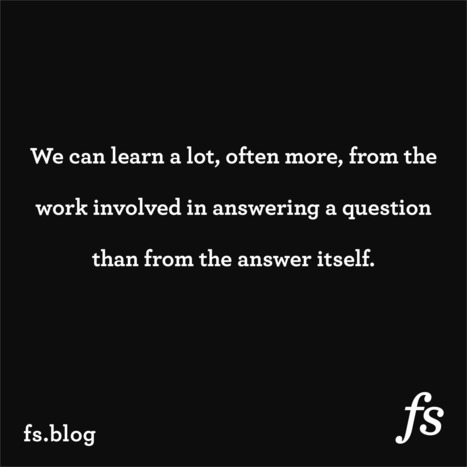

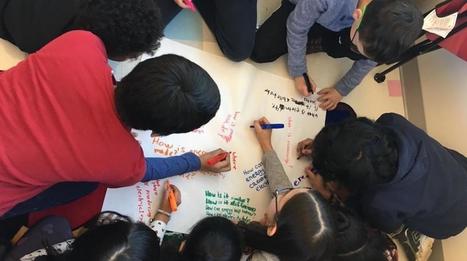
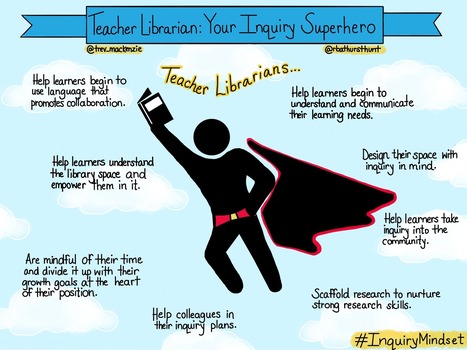
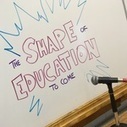


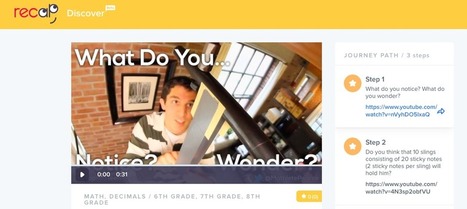
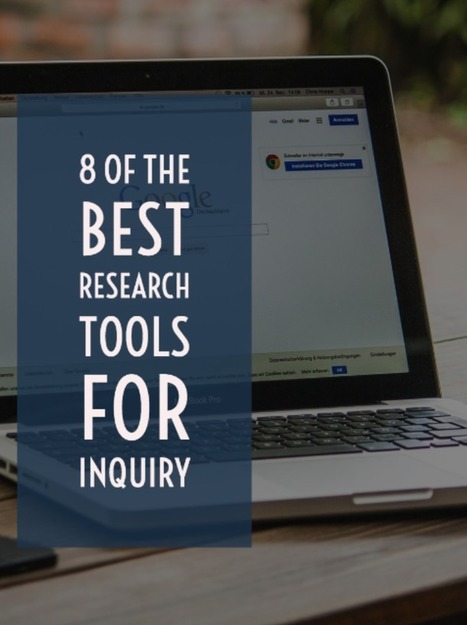


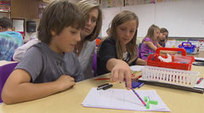




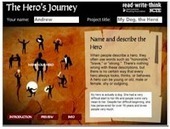

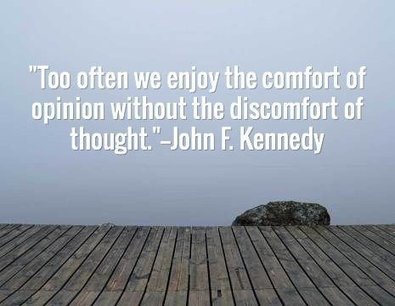
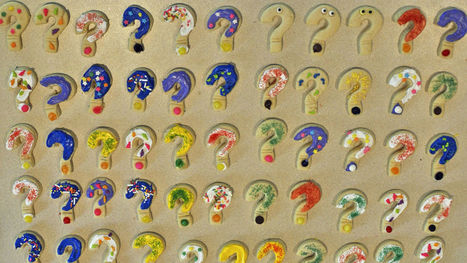
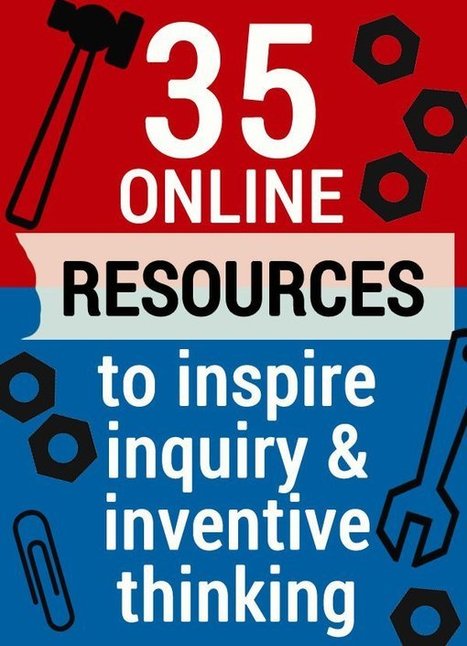

![Use These 5 Steps to Learn How to Ask Good Questions [Infographic] | Education 2.0 & 3.0 | Scoop.it](https://img.scoop.it/9Ig5e-RUbd2Bd5JiwjpP7Tl72eJkfbmt4t8yenImKBVvK0kTmF0xjctABnaLJIm9)

